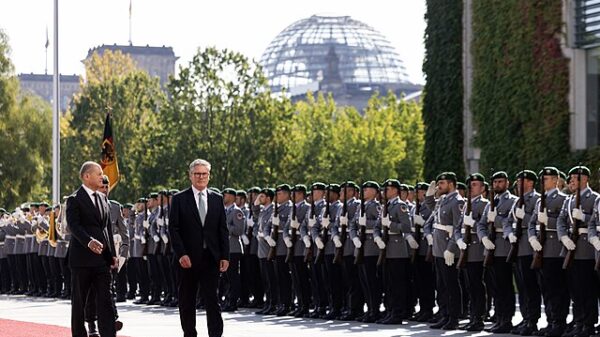Staff writer Romilly Spaul looks at the Conservative Party’s recent track record on human rights policy and asks if we should be worried.
Over the last thirteen years, Downing Street has housed five consecutive Prime Ministers — a rate unmatched since 1935. What these five individuals have in common, besides their blue party membership cards, is a gentle flirtation with the idea of withdrawing from the European Convention on Human Rights (ECHR). From David Cameron and his emphasis on “British judges making decisions in British courts” to our current Prime Minister Rishi Sunak the Illegal Migration Bill which has “more than a 50% chance” of violating the ECHR, the Conservatives have been steadily pursuing this agenda – regardless of who’s in office. But what would withdrawing from the European Convention on Human Rights mean? And how would it affect us?
Isn’t it something to do with Brexit?
In a word, no. In two words… kind of.
The ECHR was created in response to the atrocities of the Second Word War. Drawing direct inspiration from the 1948 Universal Declaration of Human Rights, the ECHR both acknowledged and created a way of enforcing these personal freedoms: the European Court of Human Rights. The Court is made up of 46 judges, who do not sit on behalf of any nation, and deliberate on cases brought against nations who are accused of violating the Convention. If a country is found guilty of violating an article, they aren’t expelled from the Convention — the UK for example has been found violating the ECHR on 329 separate occasions, and we’re one of the lesser offenders — but the countries found in violation comply with the Court’s judgements by convention and international law. In 1998, the ECHR was enshrined in British law as the Human Rights Act (HRA), making the UK obligated by domestic law too.
The ECHR was drafted by the Council of Europe, which predates the EU. Membership of the Council is not contingent on membership of the EU, nor is the United Kingdom expected to leave the Council after having left the EU. Indeed, the only two European states not in the European Council are Belarus, which never joined, and Russia, which was expelled after invading Ukraine. No one has voluntarily withdrawn from the Council, as of yet. So, no – we are not expected to withdraw from the ECHR just because we are no longer in the EU.
However, and this is where the “kind of” comes in, the Brexit referendum fundamentally changed British politics and, unsurprisingly, British relations with Europe. “British judges making decisions in British Courts”, a David Cameron soundbite from 2015, places British identity at the forefront. Enter the European judges and European courts, looking to violate British sovereignty with gusto and loathing.
Though David Cameron was a Remainer, and in that same PMQ session he clarified that his plans didn’t involve leaving the ECHR, he was working to appease the Eurosceptic faction of his party, as well as voters who the Conservatives were at risk of losing to UKIP. From this point onwards, it can be seen that courting the Eurosceptic vote corresponded with massive electoral success for the Conservative party, culminating in their landslide win in the 2019 general election.
But how does this connect to the ECHR?
Many of the factors which motivated people to vote to leave the EU, such as “the principle that decisions about the UK should be taken in the UK” and the “chance for the UK to regain control over immigration and its own borders”, are now arguments wielded in favour of leaving the ECHR too.
Theresa May, who long received flack for being a Remainer, was nevertheless a staunch advocate for leaving the ECHR. Prior to the Brexit referendum, May (who was then home secretary) argued that Britain should instead leave the ECHR, declaring in a speech that “the ECHR can bind the hands of parliament, adds nothing to our prosperity, [and] makes us less secure by preventing the deportation of dangerous foreign nationals.” Here, May elucidates the main Conservative arguments against the ECHR: the diminishment of British sovereignty and national security.
Just over a year later, May, now Prime Minister, stated on the campaign trail that “if human rights laws stop us from [restricting the freedom of movement of terrorist suspects] we will change those laws so we can do it”. These remarks were soon criticised by UN human rights chief Zeid Ra’ad al-Hussein, who called them “highly regrettable, a gift from a major western leader to every authoritarian figure around the world who shamelessly violates human rights under the pretext of fighting terrorism”.
May’s successor, Boris Johnson, picked up the flaming torch of ECHR withdrawal and held it high. On the 14 April 2022, Johnson announced the Rwanda plan. Johnson argued that the solution to disrupt the business practice of people smugglers was to fly planes full of asylum seekers to Rwanda, never to return. Rwanda is a country with multiple ongoing human rights violations, and to send people within the United Kingdom’s jurisdiction to a country where it could reasonably be expected that their human rights could be violated goes against the very first Article of the Convention.
Johnson acknowledged the questionable legality of the policy, stating: “We’re confident that our new migration partnership is fully compliant with our international legal obligations, but nevertheless we expect this will be challenged in the courts… [Britain has] such a formidable army of politically motivated lawyers who for years have made it their business to thwart removals and frustrate the government… We will do whatever it takes to deliver this new approach. Initially within the limits of the existing legal and constitutional frameworks, but also prepared to explore any and all further legal reforms that may be necessary.”
The ECHR has prevented planes removing migrants from the UK to Rwanda, granting an urgent interim measure grounding the first flight to Rwanda an hour and a half before take off. This ruling did not discourage the prime minister from pursuing the Rwanda policy – when asked about possibly withdrawing from the ECHR, Johnson responded “will it be necessary to change some laws to help us as we go along? It may very well be.” Unfortunately for him, Johnson was forced to resign a few weeks later and never had the chance to charter another flight. Liz Truss similarly resigned merely two weeks after announcing at the Conservative party conference that she would be “expanding the Rwanda scheme… bringing forward legislation to make sure that no European judge can overrule us”.
Again, rhetoric over withdrawal from the ECHR boils down to UK sovereignty and national security, the idea that the ECHR is fundamentally ill-suited to British issues. The Conservatives have attempted to both demonstrate and solve this problem by introducing a British Bill of Rights to replace the HRA, but the bill was dropped by Truss after dismissing its sponsor, Dominic Raab. New measures would have included making deportation challenges substantially more difficult for foreign nationals (Section 8), prohibiting courts from finding that rights must be protected by public bodies (Section 5) and disregarding human rights violations which may occur as a result of overseas military operations (Section 14).
To sum up, the Conservatives have a long history of opposition to the ECHR. And how is Rishi Sunak measuring up to that legacy, you ask? By continuing to pursue the Rwanda scheme, of course. The Illegal Migration Bill, published on 10 March 2023, aims to dismantle existing legal challenges to the Rwanda scheme. These measures include preventing detained immigrants from applying to the Immigration Tribunal for bail or for judicial review (Section 13), which is what prevented the first Rwanda flight. The bill also removes protections for victims of modern slavery, and removes the requirement of a ‘recovery period’ which would allow victims to rest in the United Kingdom whilst recovering from the effects of human trafficking (Section 21).
This bill marks a turning point in the conversation between the government and the European Court. The Human Rights Act requires the minister in charge of a bill to declare before its second reading in Parliament that either the bill is compatible with the ECHR or that a statement of compatibility cannot be declared, but the government wishes Parliament to nevertheless continue with the bill (Section 19). On the first page of the Illegal Migration Bill, it reads:
Secretary Suella Braverman has made the following statement under section 19(1)(b) of the Human Rights Act 1998:
I am unable to make a statement that, in my view, the provisions of the Illegal Migration Bill are compatible with the Convention rights, but the Government nevertheless wishes the House to proceed with the Bill.
The bill passed through its second reading with 313 ‘ayes’ and 251 ‘noes’, meaning that it will now pass into committee, where the bill can be further debated. Former parliamentary lawyer Alexander Horne predicts that Braverman’s statement will set off a chain reaction, “What you’re eventually doing is saying, well, the domestic courts will issue a declaration of incompatibility saying that this isn’t compatible with our convention rights but because it’s primary legislation they can’t overrule it, they just have to go along with it.
“So it will then go to Strasbourg because you’ve exhausted your domestic remedies and you’re effectively giving quite strong signalling to Strasbourg saying read the convention in this way or if you don’t, tonight, you’re setting up a conflict with the UK.”
Horne added, “I think the government thinks that banging on about Strasbourg is a new version of banging on about Europe.”
But if we do end up withdrawing from the ECHR, how would it affect us?
That’s a difficult question to answer, considering that not one country has (voluntarily) withdrawn from the ECHR. It would most likely be very similar to Brexit, with an elongated, divisive withdrawal process and unexpected consequences (tomatoes, anyone?).
Certainly, it would destabilise Northern Ireland, so soon after the Windsor Framework agreement. The Good Friday Agreement states that “The British government will complete incorporation into Northern Ireland law of the European Convention on Human Rights” (Section 6). To withdraw from the ECHR would require a complete renegotiation of this crucial peacekeeping legislation and jeopardise the fragile peace. Alyson Kilpatrick, the Chief Commissioner of the Northern Ireland Human Rights Commission (an independent organisation which reports to Parliament), has emphasised this point, publishing a statement in response to the British Bill of Rights. She reminded the government “of the potential impact on the delicate peace process of altering the Human Rights Act or diminishing the reach of the European Convention on Human Rights”.
To consider other possible consequences of withdrawing from the ECHR, one must look at the implications offered by the act of withdrawal. Would we truly be at risk of losing all our rights in one fell swoop, transformed overnight into a totalitarian nightmare of despotic proportions? Probably not. But we could be one step closer, which is a step too far. The ECHR exists not to protect individual citizens, but to restrict executive power via judicial overview, something especially necessary to the UK considering our fusion of executive and legislative branches. The government cannot and must not be indisputable, much as they would like to be, and removing this check to executive power would be the strongest blow to British democracy since the annulment of Magna Carta.
















